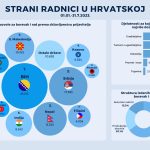“The debt and the deficit have fallen, and Croatia is finally on the right path,” says the Finance Minister.
In a radio interview on Monday morning, Finance Minister Zdravko Marić said there are good reasons to expect that Croatia could leave the Excessive Deficit Procedure shortly, since 2016 was an exceptional year for public finances, reports Poslovni.hr on May 15, 2017.
Minister Marić said that he hoped the European Commission (EC) would soon announce that Croatia has left the excessive deficit procedure (EDP) and added he was satisfied with the EC’s economic forecasts, since they are in line with the expectations of Croatian institutions. “Not only did we fulfill the original EC recommendations, but we did a lot better. The deficit was 0.8 percent of GDP, which is below 3 billion kuna. When we take into account how much interest we pay annually, this is actually the primary surplus,” Marić said, recalling that the planned deficit was 2.6 percent of GDP. He also pointed out that public debt would continue to fall in the coming years as a share of GDP.
He is also pleased with last week’s economic projections of the European Commission because, unlike previously when they differed significantly, they are now almost fully in line with the projections of the Ministry of Finance, the Croatian National Bank (HNB), the Economic Institute and other institutions.
Last week, the European Commission slightly lowered its estimate of GDP growth in 2017 from 3.1 to 2.9 percent, mainly due to the possible consequences of the crisis in Agrokor. The Commission estimates that the general government deficit could increase to 1.1 percent of GDP this year, mainly due to the impact of the tax reform, but should fall to 0.9 percent in 2018. Public debt should fall from 84.2 to 81.9 percent of GDP this year, and next year it could further slip to 79.4 percent.
“Croatia is finally on the right path, that is the credibility which these figures provide,” Marić pointed out.
The Governor of the Croatian National Bank (HNB) Boris Vujčić said that HNB would give instructions to banks to enable their clients the option to convert loans with variable interest rates into fixed rates. Vujčić explained that there was interest rate risk because interest rates are now at historically lowest level and may rise in the future, while most loans in Croatia have variable interest rates. The biggest risk is for long-term loans, for example, those with the repayment period of 20 and more years. “There is a possibility of refinancing, and the HNB wants the banks to offer this option. If some banks choose not to accept our recommendations, the HNB will inform their clients about the possibilities in other banks,” said Vujčić.
Asked by journalists how changes in global interest rates could influence Croatian public finances, Minister Marić said that his Ministry was thinking about issues connected with managing public debt. “The focus is on financial restructuring. We have good cooperation with financial institutions, especially with the World Bank. We have their strong support,” Marić concluded.







